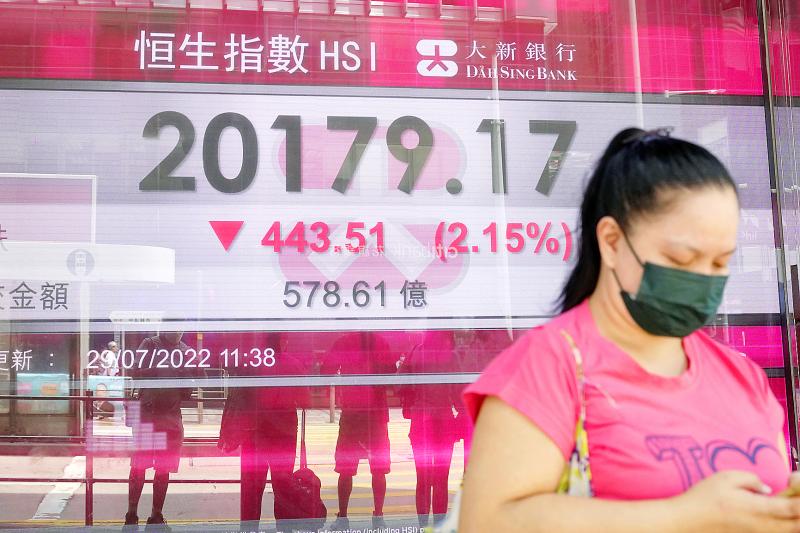Asian shares were mixed on Friday, as Chinese shares sank after leaders acknowledged that the official 5.5 percent growth target for this year would not be met.
Investors appear to have grown more convinced that the US Federal Reserve might temper its aggressive interest rate hikes aimed at taming inflation after the US Department of Commerce reported that the US economy contracted at a 0.9 percent annual pace in the past quarter. That followed a 1.6 percent year-on-year drop in the first quarter.
Investors were also cautiously eyeing regional tensions over China’s stance on Taiwan after US President Joe Biden and Chinese President Xi Jinping (習近平) spoke for more than two hours on Thursday.

China left no doubt it blames the US for a deteriorating relationship, but the White House said the call’s aim was to “responsibly manage our differences and work together where our interests align.”
In Taipei, the TAIEX closed up 108.17 points, or 0.73 percent, at 15,000.07, posting a weekly gain of 0.34 percent. Turnover totaled NT$222.857 billion (US$7.44 billion).
Hong Kong’s Hang Seng Index dropped 2.26 percent to 20,156.51, losing 2.2 percent weekly, while the Shanghai Composite Index shrank 0.89 percent to 3,253.24, declining 0.51 percent from a week earlier after China’s leaders said that the struggling economy would not hit its official growth target of 5.5 percent this year.
The announcement after a Chinese Communist Party planning meeting on Thursday said that Beijing would try to prop up sagging consumer demand, but would stick to strict anti-COVID-19 tactics that have disrupted manufacturing and trade.
It underscores the high cost Xi’s government is willing to incur to stop the virus in a politically sensitive year when he is widely expected to try to extend his term in power.
Elsewhere, South Korea’s KOSPI added 0.67 percent to 2,451.50, rising 2.44 percent weekly, while Australia’s S&P/ASX 200 gained 0.81 percent to 6,945.20, up 2.26 percent from a week earlier, and India’s SENSEX increased 1.25 percent to 57,570.25, posting a weekly gain of 2.67 percent.
Japan’s benchmark Nikkei 225 lost 0.05 percent to 27,801.64, down 0.4 percent on the week, while the broader TOPIX dropped 0.44 percent to 1,940.31, declining 0.8 percent from a week earlier.
Japanese government data showed factory output last month jumped 8.9 percent from the previous month, marking the first rise in three months.
The recent easing of COVID-19 lockdowns in China has helped boost Japanese production.
“On the economic data front, easing China’s restrictions also drove a stronger-than-expected June output for Japan, with China’s reopening potentially having a positive knock-on impact across the region as well into the second half of the year,” said Yeap Jun Rong, market strategist at IG in Singapore.
A surge in COVID-19 infections to record levels in many parts of Japan has raised concern, but Robert Carnell, regional head of research for Asia-Pacific at ING, said that Japan’s second quarter GDP would rebound marginally from the first quarter’s contraction.
Additional reporting by staff writer, with CNA

South Korea’s equity benchmark yesterday crossed a new milestone just a month after surpassing the once-unthinkable 5,000 mark as surging global memory demand powers the country’s biggest chipmakers. The KOSPI advanced as much as 2.6 percent to a record 6,123, with Samsung Electronics Co and SK Hynix Inc each gaining more than 2 percent. With the benchmark now up 45 percent this year, South Korea’s stock market capitalization has also moved past France’s, following last month’s overtaking of Germany’s. Long overlooked by foreign funds, despite being undervalued, South Korean stocks have now emerged as clear winners in the global market. The so-called “artificial intelligence

NEW IDENTITY: Known for its software, India has expanded into hardware, with its semiconductor industry growing from US$38bn in 2023 to US$45bn to US$50bn India on Saturday inaugurated its first semiconductor assembly and test facility, a milestone in the government’s push to reduce dependence on foreign chipmakers and stake a claim in a sector dominated by China. Indian Prime Minister Narendra Modi opened US firm Micron Technology Inc’s semiconductor assembly, test and packaging unit in his home state of Gujarat, hailing the “dawn of a new era” for India’s technology ambitions. “When young Indians look back in the future, they will see this decade as the turning point in our tech future,” Modi told the event, which was broadcast on his YouTube channel. The plant would convert

‘SEISMIC SHIFT’: The researcher forecast there would be about 1.1 billion mobile shipments this year, down from 1.26 billion the prior year and erasing years of gains The global smartphone market is expected to contract 12.9 percent this year due to the unprecedented memorychip shortage, marking “a crisis like no other,” researcher International Data Corp (IDC) said. The new forecast, a dramatic revision down from earlier estimates, gives the latest accounting of the ongoing memory crunch that is affecting every corner of the electronics industry. The demand for advanced memory to power artificial intelligence (AI) tasks has drained global supply until well into next year and jeopardizes the business model of many smartphone makers. IDC forecast about 1.1 billion mobile shipments this year, down from 1.26 billion the prior

People stand in a Pokemon store in Tokyo on Thursday. One of the world highest-grossing franchises is celebrated its 30th anniversary yesterday.